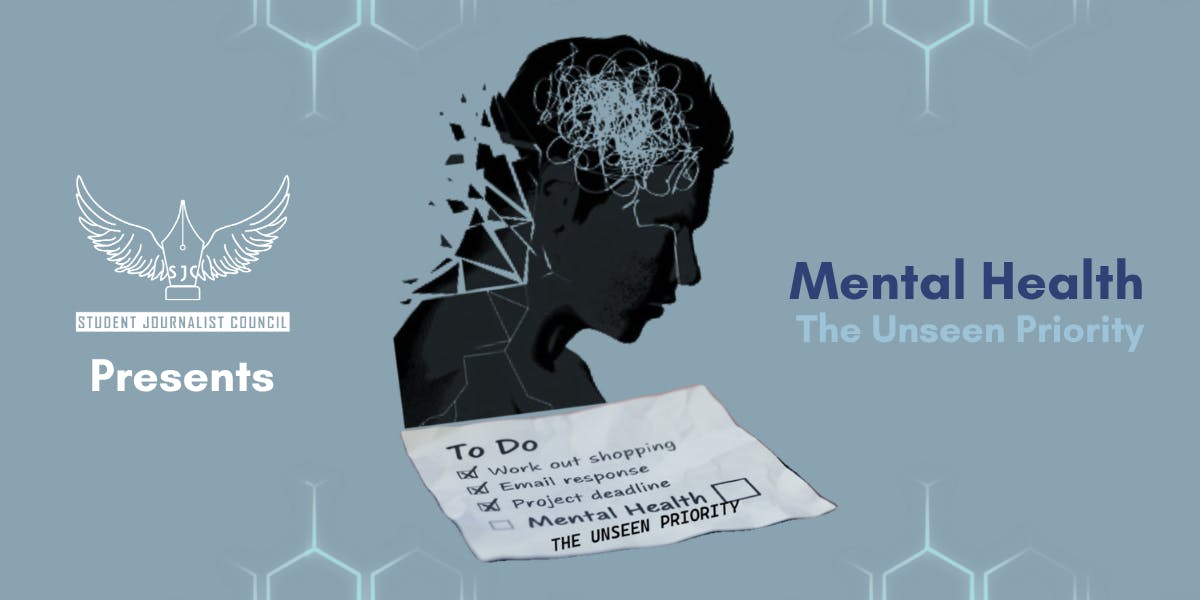
Author
Board of 2025-26
Board of 2025-26

Understanding Mental Health
We often prioritize our grades, deadlines and achievements, but forget the one thing that is makes it all possible -a healthy mind.Mental health influences every part of our life. A sound mind helps us make good decisions, stay calm under pressure, and handle challenges in a healthy way. It's not about living a stress-free life but about how we handle stress and respond to difficult situations.
Mind–Body Connection
The mind and body are not separate entities; each influences the other. A healthy body supports a healthy mind, and a peaceful mind helps the body stay strong. Taking care of both is essential for overall well-being. To improve mental health, try doing some exercise or spend at least 10 minutes every day doing what you love. When you feel stressed, even a short walk can help clear your mind. This connection becomes even more important during college, a time when both our mind and body are under pressure.
College Life and Mental Health
College days can be stressful and hectic with assignments, tests, and other activities. However, everything can be managed better when you are in a good mental state. Don't sacrifice your health for studies; instead, focus on maintaining it, as a healthy mind will actually help you perform better academically. College is a place where your brain is constantly challenged, but it is also a place to enjoy, achieve, and learn. Therefore, the utmost priority should be given to your mental health. Talk with friends and don't isolate yourself. College is the best place to make new friends, so take the opportunity to socialize and build support. Be curious and don't just study for marks. First, try to understand why you are learning a particular subject. Make it a habit to learn something new every day, as it challenges your brain and keeps it active. The brain is like a sword - if you don't use it, it will rust.
Breaking the Stigma
Talk about your mental health issues with your friends and don't be ashamed. We are human, and everyone has struggles. Treat mental health like physical health. Don't keep your feelings bottled up; addressing them early can prevent bigger problems later. There is a common stereotype that mental illness means being mad, but that's not true. Mental health struggles are a normal part of life, and addressing them early can help a lot. Seek a psychologist, try therapy, practice self-reflection, or simply sit with a friend over tea and egg puffs and share what you're feeling. Talking about mental health doesn't make you weak; it makes you human.
Awareness
Most of us lack awareness about mental health and often fail to notice it because it is invisible. As the World Health Organization's motto for this Mental Health Day emphasizes spreading awareness, we should start with our friends and family. Take the time to talk with them; sometimes, a simple five-minute conversation can make a big difference in understanding what they are struggling with.
Habits for Better Mental Health
· Make small changes to your routine instead of big ones. Large changes rely heavily on willpower and can drain your energy, while small, consistent adjustments are easier to maintain and more effective in the long run.
· Exercise every day, but weightlifting or going to the gym isn't necessary. Even a morning walk or some cardio can help you keep your mind and body healthy.
· College often requires sitting idle for hours with minimal breaks; don't just slouch in bed afterward. Use your evening to stay active by playing any sport or engaging in any physical activity you enjoy.
Mobiles - The Double-Edged device
Mobile phones are often considered a major threat to mental health. You hear this frequently, but let's look at it from a different perspective. Mobile phones can be both useful and harmful, depending on the user. Most of us use them for relaxation-or at least we think we do-but what actually happens is that they give a quick dopamine hit. It feels pleasurable in the moment, but over time this can lead to addiction as you become dependent on activities like endless scrolling, reels, or social media feeds.
But it's not impossible to change. The first step is realizing the habit and making small, effective adjustments. Many tips suggest putting the phone in another room or deleting apps, but here's a more practical approach: don't fight your brain, redirect it. Instead of scrolling for relaxation, try activities that truly relax you. Spend time in nature, stretch, or go for a mindful walk. These small steps retrain your brain while still giving it a sense of reward.Technology isn't the enemy -how we use it decides whether it heals or harms.
Conclusion
Mental health isn't luxury; it's a foundation. Whether in college ,at work or, in life, taking care of your mind is the first step towards true success and happiness.
Credits:
Writing: Sivaa V (MECH'28)
Poster Design: Mahisha (ECE'27)
DISCLAIMER: The opinions or views expressed are views of the individual writers and not of the institution. All forms of content published in this website and Student Journalist Council - GCT's social media handles are strictly properties of Student Journalist Council - GCT and are works of the various teams of the respective academic years.
No article, story or any form of content produced by Student Journalist Council - GCT is meant to be reproduced or distributed, either in parts or whole, without prior permission from Student Journalist Council - GCT for any purposes.